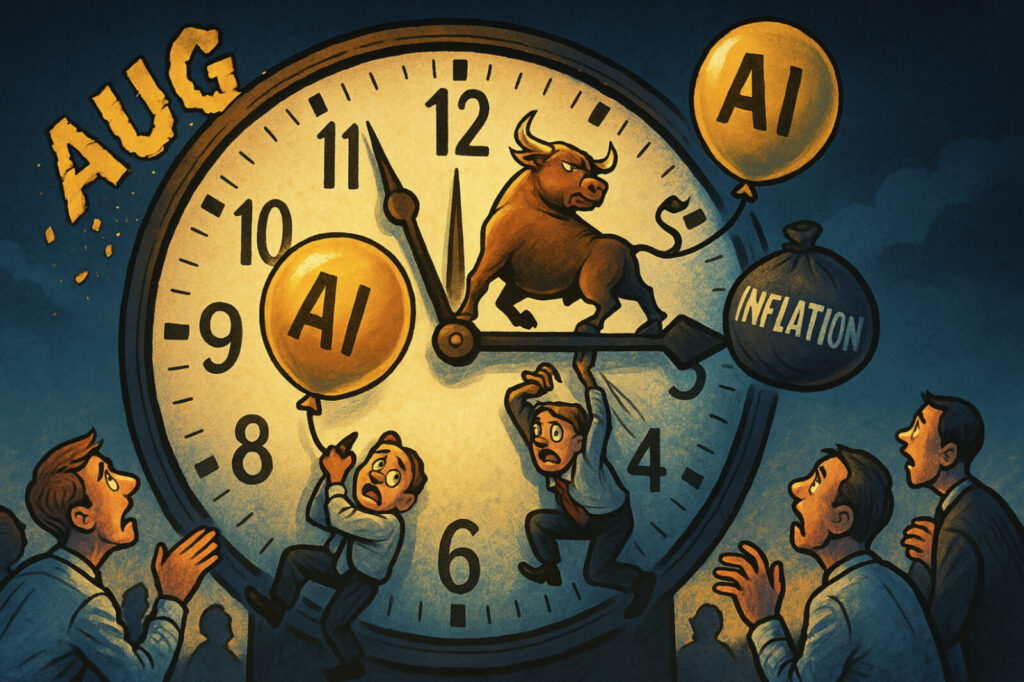Introduction
On 29 August 2025, the U.S. stock market ended August on a cautious tone. After rallying most of the month, index gains paused as traders took profits and braced for critical inflation data. The S&P 500 slipped 0.6%, though managed to close the month with a solid +1.9% gain. The Dow dipped marginally, and the Nasdaq fell by 1.2%, driven primarily by pressure on tech shares. Investors are now closely focused on key indicators—the Personal Consumption Expenditures (PCE) index and regional inflation measures—as they anticipate the Federal Reserve’s next policy move.
Markets Step Back from Record Territory
Friday’s session saw broad market declines, signaling a tactical pause following weeks of consistent gains. The S&P 500 fell to 6,460.26, while the Dow ended at 45,544.88, and the Nasdaq closed at 21,455.55. The small-cap Russell 2000 showed more resilience, declining only 0.5%—helping cap the overall pullback. Reflecting a month’s worth of momentum, all major indices logged strong August performances: S&P 500 up 1.9%, Dow +7.1%, Nasdaq +11.1%, Russell 2000 +6.1% year-to-date.
Inflation Data Take Center Stage
Investor caution stemmed largely from looming inflation indicators. Core personal consumption expenditures (PCE)—the Federal Reserve’s preferred inflation gauge—is expected around 2.9% annually, with a monthly uptick near 0.3%. This data is critical in assessing the timing and scale of potential rate cuts, with markets already pricing in high odds for a September move. Analysts and Fed officials are watching for whether recent tariff pressures will sustain inflation longer than hoped.
Asian Markets Buoyed by Tech Optimism
Elsewhere, Asian equities closed higher, buoyed by strong tech sector cues, particularly from Nvidia’s earnings. The MSCI Asia-Pacific index advanced 0.4%, though regional disparities surfaced: China’s STAR 50 fell 2.5%, while CSI 300 and Hang Seng rose modestly. Japan’s Nikkei dipped slightly. Sentiment remained optimistic: futures continue to price in an easing Fed, signaling growing confidence in a pivot.
Global Policy Pressures Persist
Markets also factored in sustained political discomfort. Fed Governor Lisa Cook’s attempt to resist being fired stoked debates over central bank independence. Meanwhile, Fed Governor Christopher Waller and others floated cautious endorsements for rate cuts in coming months—creating a backdrop of policy uncertainty that tempered enthusiasm.
Commodities and FX Respond Subtly
The U.S. dollar softened, reflecting expectations of easier monetary policy, while gold hovered around $3,410 per ounce, serving as a safe haven amid policy ambiguity. Oil prices dipped slightly, pressured by supply concerns but supported by growth expectations tied to easing trends.
August’s Macro Picture: A Balanced Finish
Looking back, August was overall positive for U.S. markets—with the Nasdaq and small caps particularly strong amid AI and tech leadership. Still, inflation signals and geopolitical uncertainties are beginning to temper optimism. Many investors see the market as entering a consolidation phase: gains are acknowledged, but near-term volatility remains possible.
Conclusion
29 August 2025 concluded the month on a reflective note—markets stepping back from highs as inflation data looms and high-valuation sectors soften. It was a month defined by strong equity performance, but now shadowed by macroeconomic caution.
Key questions ahead:
- Will PCE inflation data align with market hopes—or shift trajectory on rate expectations?
- Can tech and AI leadership regain momentum amid cooling speculation?
- Will central bank credibility hold amid political shocks—or will policy uncertainty erode confidence?
August ends with optimism moderated by vigilance. Markets are poised—prepared to move, but cautious of what lies ahead.
